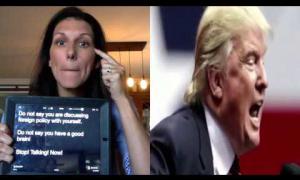Rhetorical Recap: Familiar Lines, Varied Reactions
June 19, 2019
President Donald J. Trump Re-election Campaign Launch, Amway Center, Orlando FL, June 18, 2019.
Donald Trump filed his papers for re-election on his inauguration day in 2017. Last night he declared his long-gestating candidacy in a speech loaded with lines from his 2018 campaign rally rambles and his 2019 State of the Union Address. Along with the Greatest Hits a unique section in the middle featured departing White House Press Secretary Sarah Huckabee Sanders. She came to the podium to praise her employer after he all but declared her candidacy for Governor of Arkansas, a post her father held for eleven years.
The audience supplied the most interesting aspect of the long event. They booed lustily at Trump’s mention of his scapegoats: the Fake News Media, the Democrats, Crooked Hillary, swampy Washington Politicians. They followed their boos with the standard chants; CNN responded to “CNN sucks” by yanking its coverage and returning to the studio.
In marked contrast, their cheering was consistently weak for Trump’s invocation of his economic accomplishments. The president played for affirmation of his record with two series of boasts about high stock market and low unemployment numbers, especially for persons of color and women. But the crowd volume was much weaker than for the demonizations.
The President roused the assembled when he asked them to vote with their voices as to which campaign slogan ought to be adopted for 2020: “Make America Great Again” or “Keep America Great.” Mentioning the many judges he has appointed and the Second Amendment got rises as well. A solid cry of support went up after the assertion that “America will never be a socialist country.” However, promises to cure cancer, end AIDS, and land astronauts on Mars did not fare as well on the noise meter. Ditto for Trump’s claim that air and water quality in America led the world.
Trump lashed out at Joe Biden and Bernie Sanders once each and did not name-check any other Democratic candidates. He did not go after Nancy Pelosi or Chuck Schumer, and while he vehemently denounced the Mueller Report as a hoax he did not assail Mueller as an individual. Barack Obama came in for heat. Mostly, however, Trump harangued Crooked Hillary and her emails.
The unspoken word hanging over the event was impeachment. Trump talked about being under siege, him and them:
They went after my family, my business, my finances, my employees, almost everyone that I've ever known or worked with, but they are really going after you. That's what it's all about, not about us, it's about you. They tried to erase your vote, erase your legacy of the greatest campaign and the greatest election, probably in the history of our country, and they wanted to deny you the future that you demanded and the future that America deserves, and that now America is getting.
To underscore his argument he cited the treatment accorded Judge Kavanaugh. All this received enthusiastic jeering.
Perhaps the appeal of attending a Trump speech lies mainly in the opportunity to vent political hostility. Perhaps anger at opponents routinely elicits higher volume than appreciation for policy achievements. These and other possible explanations for the varied responses to the president’s remarks will be duly parsed by Trump campaign staff and consultants. Whether he listens to them and adapts his stump speech (and, dare we say, his policy moves) accordingly is anyone’s guess, although we saw recently what happens when members of Trump’s team try to get a message to him via leaks: “you’re fired, pollsters!”




